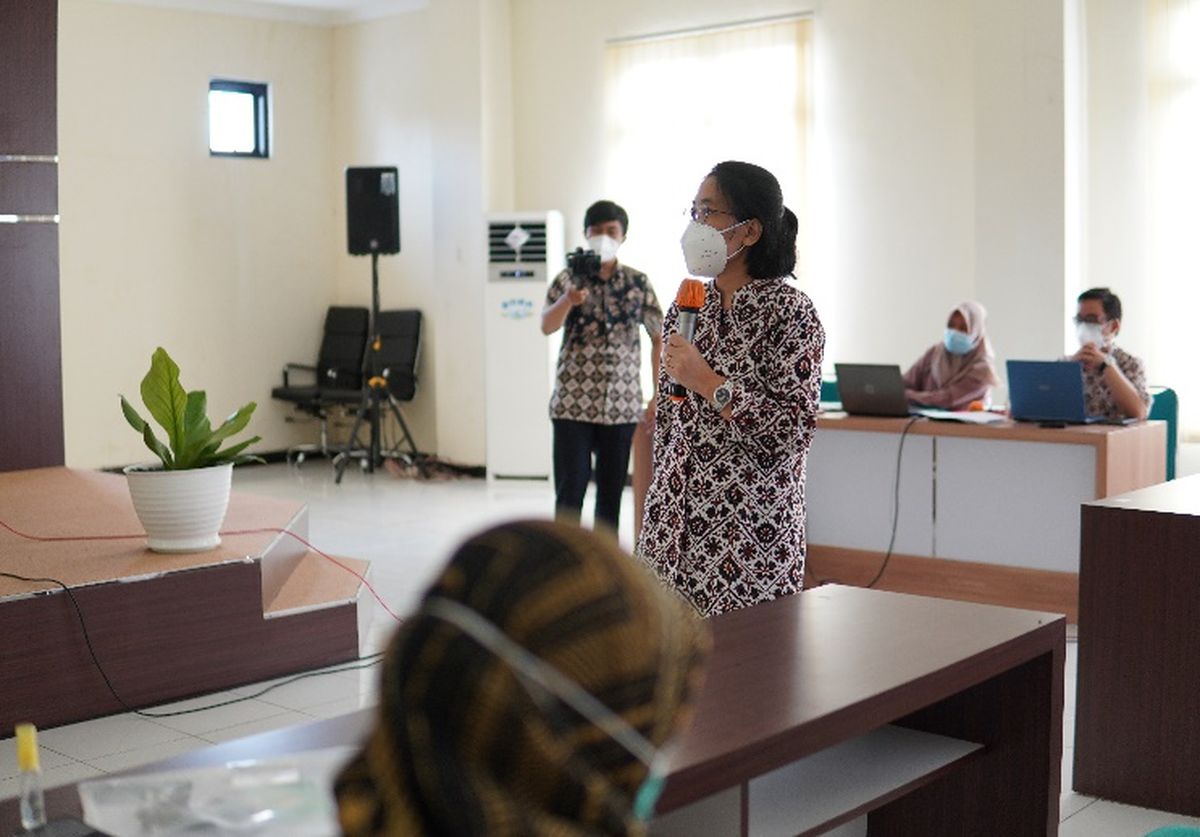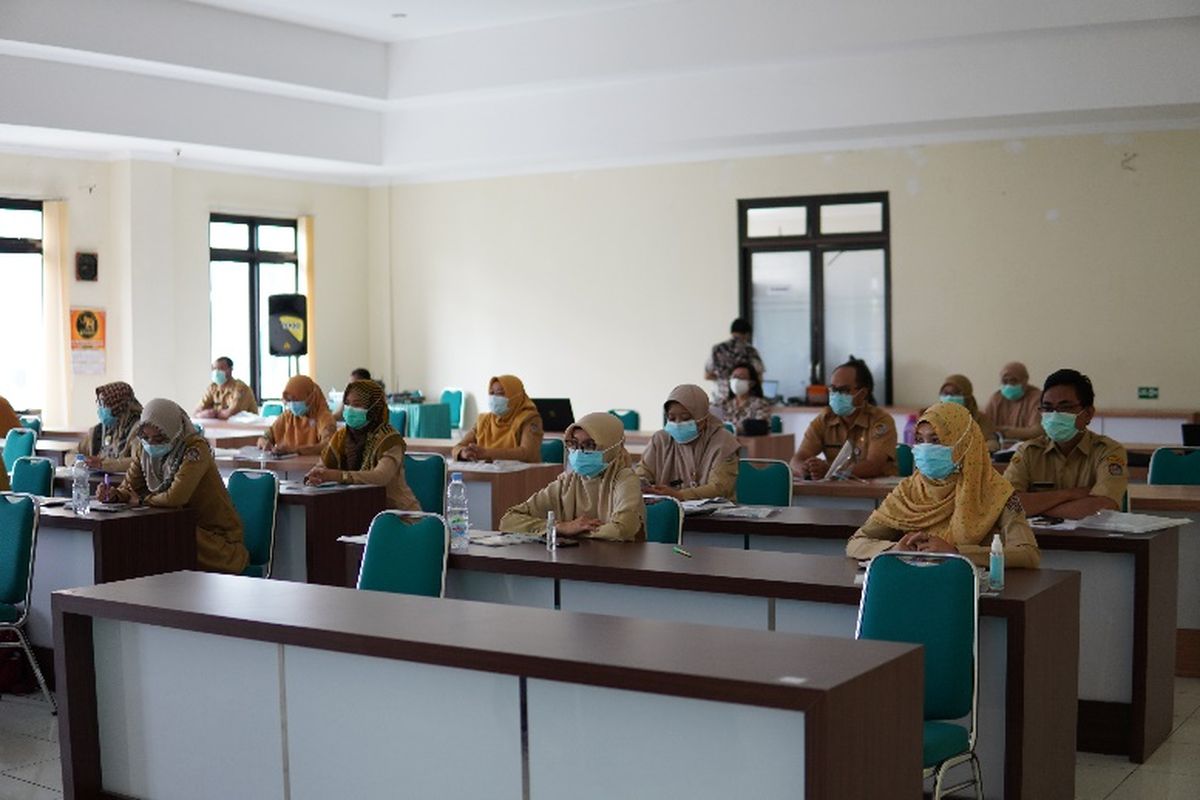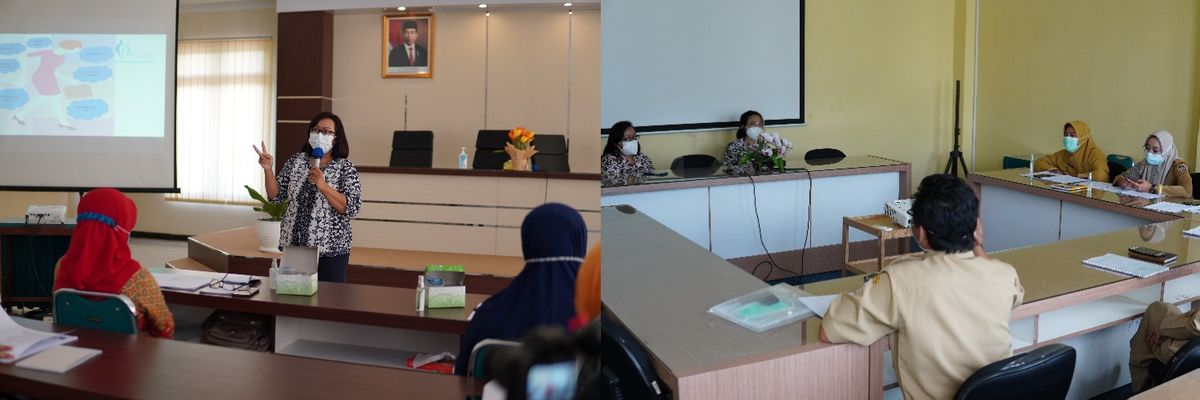A Training on the Use of Algorithms in the Context of Early Detection of NCD in Posbindu Working Area Karanganyar District
"The implementation of non-communicable disease programs in the midst of the COVID-19 pandemic"

Scaling-Up NCD Interventions in South-East Asia (SUNI-SEA) is a Project for Enhancing Non-Communicable Diseases (NCD) Interventions in Southeast Asia (which was later abbreviated as SUNI-SEA). This project is a research consortium project involving the collaboration of nine consortium members, which includes:
a. Medical Center University of Groningen, Netherland;
b. University of Groningen, Netherland;
c. University of Passau, Germany;
d. The University of Trnava, Slovak Republic;
e. HelpAge Internasional;
f. Age Internasional;
g. Thai Nguyen University, Vietnam;
h. Health Strategy and Policy Institute, Vietnam; and
i. Universitas Sebelas Maret, Indonesia.
This project aimed to strengthen the availability of management and prevention service programs for diabetes mellitus and hypertension through evidence-based medicine in Indonesia, Myanmar, and Vietnam with a better understanding of effective strategies for enhancing the PTM intervention program that had existed. This project would involve both community-based activities and primary health care services with a synergy between the two for better benefits in the health sector.
Lecturers of the Faculty of Medicine, Universitas Sebelas Maret (FK-UNS) always uphold the Tri Dharma of higher education, which includes education, research, and community service. The lecturers’ education is a source of knowledge for conducting research and then to be applied to society. Therefore, the form of community service activities carried out by lecturers at FK UNS on Monday to Wednesday (January 11-13, 2021) at the Mawar Hall of the Karanganyar District Health Office was to conduct a training event for medical personals and cadres at Integrated Assistance Posts (Posbindu). This training activity aimed to:
1. Have knowledge and skills in using the Non-Communicable Disease Algorithm (PTM)
2. Easily identify or detect risk factors for PTM based on the results of interviews related to the patient's basic data and medical history
3. Provide specific education in accordance with existing risk factors
4. Perform various anthropometric measurements for legeartic early detection of PTM, including measurement of body mass index (BMI), abdominal circumference, and blood sugar levels
5. Interpret the various anthropometric measurements and classify them into healthy groups, have PTM risk factors, and suffer from PTM
6. Communicating related risk factors delivery, predicting the possibility of developing PTM and in coordinating care to the Puskesmas (referral)
7. Calculating the risk prediction of PTM based on the results of anthropometric measurements
8. Determine the right time for Posbindu participants to carry out the anthropometric measurement program again

The participants consisted of medical personnel, Posbindu cadres, and FK UNS lecturers, namely:
1. Purwati, SKM., M.Kes. (Head of the Karanganyar District Health Office)
2. Warsito, SKM. (Head of Disease Prevention and Control Division, Karanganyar District Health Office)
3. Untari Wardani, SKM., M.Kes. (Section’s Head of Non-Communicable Diseases, Karanganyar District Health Office)
4. Eko Prabowo, SKM. (ie Non-Communicable Diseases Karanganyar District Health Office)
5. Emma Purwantiningsih, SKM. (Sie Non-Communicable Diseases Karanganyar District Health Office)
6. Wardiningsih, S.E. (Non-Communicable Diseases Division Karanganyar District Health Office)
7. Shelsa Arinindya, S.Psi. (Non-Communicable Diseases Division Karanganyar District Health Office)
8. Prof. Ari Natalia Probandari, dr., MPH., Ph.D.
9. Vitri Widyaningsih, dr., MS., Ph.D.
10. Dr. Eti Poncorini Pamungkasari, dr., M.Pd.
11. Dr. Ratih Puspita Febrinasari, dr., M.Sc.
12. Dr. Sumardiyono, SKM., M.Kes.
13. Stefanus Erdana Putra, dr.
14. Tantri Yunita Ratna, S.Tr. Keb.
15. Khairunissa, S.Fis.
16. Retno Galih, S.S.
17. Pamogsa Ratri Adha Dhaniar, S.Tr.Keb.
18. Dilma’aarij Riski Agustia, S.Tr.Keb.
19. Reza Pahlevi Prastawa
20. Ghazy Wira Pradipta
21. Non-communicable disease program holders and Posbindu cadres from 4 randomized health centers (Puskesmas Colomadu I, Puskesmas Jatiyoso, Puskesmas Tawangmangu, Puskesmas Kerjo)
Health protocol was still implemented in this event that lasted for three days, including training for health workers on the first day and training for Posbindu cadres on the second and third days. Prior to this training, all participants, committee members and speakers were required to take an antigen rapid test which was held at the Swab Home for the Karanganyar District Health Office. This training was opened with a safety induction by Pamogsa Ratri Adha Dhaniar, S.Tr.Keb. as Project Manager and continued with remarks by Mrs. Purwati, SKM., M.Kes. as Head of the Karanganyar District Health Office and accompanied by Mr. Warsito, SKM. as the Head of Disease Prevention and Control Division at the Karanganyar District Health Office. After the event was opened, participants took the pre-test first. The first day of training consisted of 4 sessions covering the overview of the SUNI-SEA project by the Head of the Research Project, Prof. Ari Natalia Probandari, dr., MPH., Ph.D .; overview of the training by Dr. Sumardiyono, SKM., M.Kes .; as well as an overview of the intervention phase and an introduction to the Posbindu algorithm application by Vitri Widyaningsih, dr., MS., Ph.D. Each topic was closed with an evaluation from the participants through direct discussion and filling in the Google form. The first day's activities were closed with focus group discussions consisting of two large groups regarding the evaluation of training and implementation of Posbindu. Before leaving the location, all participants were also asked to fill out a post-test sheet via Google form to evaluate the level of understanding of the participants after attending the training.

The second day continued with training for Posbindu cadres and health workers. The activity began with a pre-test for Posbindu cadres. The second day of training was divided into five topics including: overview of the training by Dr. Sumardiyono, SKM., M.Kes .; overview hypertension by dr. Stefanus Erdana Putra; overview diabetes mellitus by Dr. Ratih Puspita Febrinasari, dr., M.Sc .; physical examination of anthropometry and blood sugar while by Tantri Yunita Ratna, S.Tr. Keb .; and the introduction of the Posbindu algorithm application by Dr. Eti Poncorini Pamungkasari, dr., M.Pd. Each topic was also closed with an evaluation from the participants through direct discussion and filling in the google form. On this second day, all participants also simulated an anthropometric examination and blood sugar practice while implementing health protocols to prevent the spread of COVID-19. The second day of training was closed with a sharing session regarding the obstacles and implementation of Posbindu in the era of adapting new habits led by the Research Team Leader Prof. Ari Natalia Probandari, dr., MPH., Ph.D.
The third day of training was opened with reflection and sharing of message impressions while being a Posbindu cadre led by Dr. Eti Poncorini Pamungkasari, dr., M.Pd. The session continued with a presentation on communication topics by Khairunissa, S.Fis. Furthermore, the cadres and health workers simulated the application of the algorithm in 4 groups according to their respective Puskesmas facilitated by Dr. Sumardiyono, SKM., M.Kes. and Vitri Widyaningsih, dr., MS., Ph.D. After receiving feedback from the facilitator, each participant, including a cadre, took a post-test to test their understanding of the entire set of materials that had been given during the two days of training. The third day's activities were closed with focus group discussions which were divided into three groups (2 groups of health workers and 1 group of cadres). This discussion discussed policies related to Posbindu, financing, and its implementation in the midst of the COVID-19 pandemic, evaluation and monitoring of the Posbindu program (challenges and obstacles faced during the COVID-19 pandemic), a referral system related to non-communicable diseases found in Posbindu during during the pandemic, as well as appropriate input for implementing non-communicable disease programs in the midst of the COVID-19 pandemic.
Public Relation of FK UNS: Ari Kusbiyanto
Translator: Wartini
 bahasa indonesia
bahasa indonesia 



